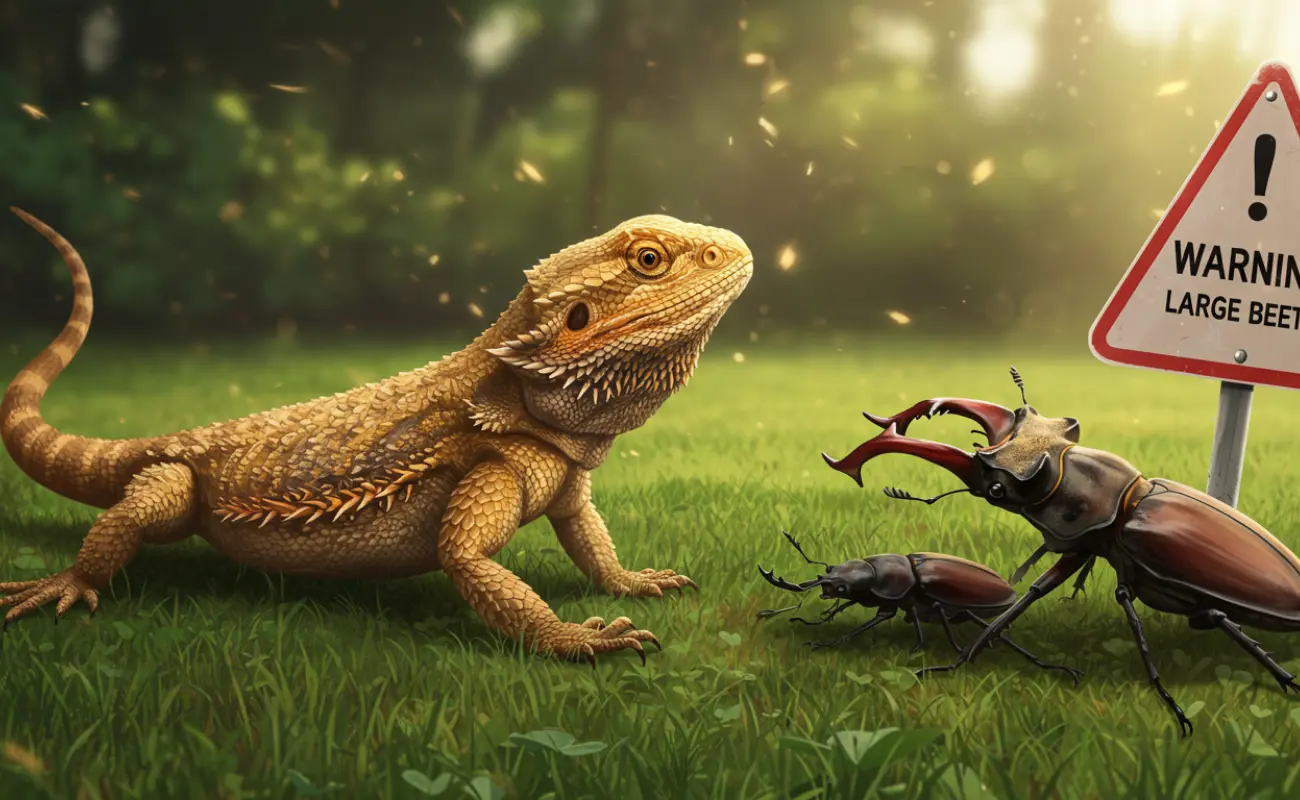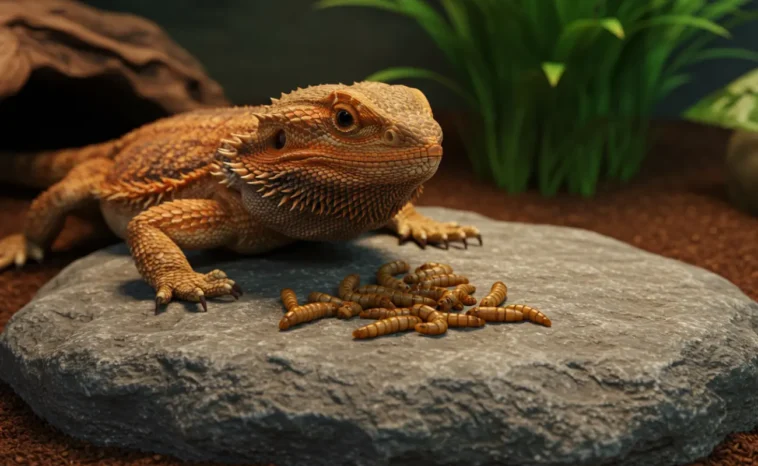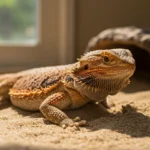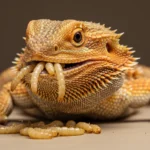Can Bearded Dragons Eat Beetles?
If you’re a bearded dragon owner, you’ve probably wondered, Can bearded dragons eat beetles? The answer isn’t straightforward, as there are several factors to consider when feeding beetles to your pet. In this article, we’ll explore the different types of beetles, their nutritional value, and any potential risks involved. By the end, you’ll know whether bearded dragons can eat beetles safely and under what circumstances.
Overview: Can Bearded Dragons Eat Beetles?
When it comes to feeding beetles to a bearded dragon, it’s crucial to understand the potential risks and benefits. Beetles, though not toxic, come with various challenges that could impact your dragon’s health, such as poor nutritional value and the difficulty of digesting their tough exoskeletons. While certain beetles may be offered on occasion, they should never be a regular part of a bearded dragon’s diet.
Can Bearded Dragons Eat Mealworm Beetles?
Are Mealworm Beetles Safe for Bearded Dragons?
Mealworm beetles are the adult form of mealworms, which belong to the darkling beetle family. Although mealworm beetles are not toxic to bearded dragons, they pose several challenges.
-
Low Nutritional Value: Mealworm beetles offer little in terms of nutritional benefit compared to other feeder insects like crickets or dubia roaches.
-
High Chitin Content: The exoskeleton of mealworm beetles is high in chitin, a hard substance that can be difficult for your dragon to digest. This can potentially lead to impaction, particularly in younger or smaller bearded dragons.
-
Feeding Recommendations: Mealworm beetles should be fed sparingly and are best offered occasionally to adult bearded dragons only. Due to the risks of digestive issues, mealworm beetles are not recommended for babies or juveniles.
Fun Fact: Many bearded dragons may not enjoy the taste or texture of mealworm beetles due to their hardness.
Can Bearded Dragons Eat Superworm Beetles?
Can Bearded Dragons Eat Superworm Beetles?
Superworm beetles are part of the darkling beetle family, much like mealworm beetles. While they are not toxic, they also have a tough exoskeleton that can be difficult for bearded dragons to digest.
-
Hard Exoskeleton and Low Nutritional Value: The hard exoskeleton of superworm beetles presents similar concerns as mealworm beetles, such as impaction or digestive blockages.
-
Feeding Recommendations: Like mealworm beetles, superworm beetles should only be offered occasionally to adult bearded dragons. They should not be fed to baby dragons, as their digestive systems are more sensitive and prone to issues like impaction.
Can Bearded Dragons Eat Mealworm Pupae?
Is Mealworm Pupae Safe for Bearded Dragons?
Mealworm pupae are the transitional life stage between the mealworm larva and adult beetle. Because they are softer than adult beetles, mealworm pupae are easier for bearded dragons to digest.
-
Easier to Digest: Mealworm pupae are generally softer and easier to digest compared to the hard exoskeletons of adult beetles.
-
Moderation is Key: While mealworm pupae are not an ideal food source, they are a better choice than beetles and can be offered occasionally to adult bearded dragons. They should not be fed to juveniles or baby dragons due to the risk of impaction.

Can Bearded Dragons Eat Wild or Outdoor Beetles?
Can Outdoor Beetles Be Fed to Bearded Dragons?
Feeding wild or outdoor beetles to your bearded dragon is highly discouraged. While it might seem like a natural food source, outdoor beetles can pose significant health risks.
-
Pesticides and Parasites: Wild beetles may carry pesticides, parasites, or other harmful substances that could seriously harm your dragon. The diet history of outdoor beetles is unknown, meaning they could have consumed something toxic that could affect your pet.
-
Real-Life Example: There have been reports of bearded dragons vomiting after consuming wild beetles, likely due to pesticide exposure.
-
Safety Tip: Always use farm-raised insects to ensure your bearded dragon’s safety.
Can Bearded Dragons Eat Large Beetles (e.g., Stag Beetles)?
Can Bearded Dragons Eat Large Beetles Like Stag Beetles?
Large beetles like stag beetles are not suitable for bearded dragons.
-
Hard Exoskeleton: Stag beetles and other large beetles have extremely tough exoskeletons, which can be nearly impossible for a bearded dragon to chew and digest.
-
Risk of Impaction: Due to their size and hardness, large beetles pose a high risk of impaction or digestive blockages.
-
Feeding Recommendations: Large beetles like stag beetles should be avoided entirely, as they are too difficult to digest and could lead to serious health issues.
Can Baby Bearded Dragons Eat Beetles?
Bearded Dragon Babies and Beetles:
Baby bearded dragons, or hatchlings, have delicate digestive systems and should never eat beetles.
-
Sensitivity of Baby Dragons: Beetles, particularly those with hard exoskeletons, are too tough for baby dragons to digest. They may cause impaction or severe digestive stress.
-
Alternative Food Options: For baby bearded dragons, focus on softer, more digestible foods like small crickets or fruit flies. It’s best to avoid even soft-bodied larvae like mealworms until they are at least 8 weeks old.
General Safety & Nutrition of Beetles
Beetles, including mealworm beetles and superworm beetles, are not ideal feeder insects for bearded dragons. They offer very little in terms of nutritional value and have tough exoskeletons that are difficult to digest.
-
Low Nutritional Benefit: Beetles should not be a regular part of your bearded dragon’s diet. They are not as nutrient-dense as other commonly fed insects like crickets or dubia roaches.
-
Digestive Concerns: The high chitin content of beetles can lead to digestive issues and even impaction if fed regularly.
Age Considerations
-
For Juvenile Bearded Dragons: Avoid feeding beetles entirely, as their digestive systems are still developing and not equipped to handle hard exoskeletons.
-
For Adult Bearded Dragons: Beetles may be offered occasionally as a snack, but should never be a staple food. Always prioritize more nutritious feeder insects.
Recommended Alternatives (Feeder Insects)
If you are looking for better alternatives to beetles for your bearded dragon, consider the following feeder insects:
Staple Options:
-
Crickets
-
Dubia roaches
-
Black soldier fly larvae
-
Hornworms
-
Silkworms
Occasional Treats:
-
Superworms
-
Butterworms
-
Waxworms
-
Pinky mice (once per month max)
Conclusion
Can bearded dragons eat beetles? Yes, but only under specific conditions and in moderation. Mealworm beetles and superworm beetles are safe for adult dragons on rare occasions, but they should never be fed to babies. Wild beetles and large beetles, such as stag beetles, should be completely avoided due to the potential health risks they pose, including toxicity and impaction.
For a balanced and healthy diet, it’s better to focus on more nutritious options like crickets, roaches, and larvae. Always prioritize the health and safety of your bearded dragon by avoiding beetles as a primary food source.
FAQ
-
Can Bearded Dragons Eat Mealworm Beetles?
-
Yes, but only occasionally and to adults. Due to their tough exoskeletons, they should not be fed to juveniles or baby bearded dragons.
-
-
Are Superworm Beetles Safe for Bearded Dragons?
-
Superworm beetles are safe for adults in moderation, but they should never be offered to baby or juvenile dragons due to digestion issues.
-
-
Can Bearded Dragons Eat Wild Beetles?
-
No, feeding wild beetles is strongly discouraged. They can carry harmful substances like pesticides and parasites.
-
-
Are Large Beetles Like Stag Beetles Safe for Bearded Dragons?
-
No, large beetles such as stag beetles are not safe for bearded dragons because their hard exoskeletons pose a risk of impaction.
-
-
Can Baby Bearded Dragons Eat Beetles?
-
No, baby bearded dragons should not eat beetles due to their sensitive digestive systems.
-
For more information on bearded dragons, check out our Bearded Dragons Guide.






2 Comments
Leave a Reply2 Pings & Trackbacks
Pingback:Can Bearded Dragons Eat Wax Worms? A Complete Guide to Feeding Wax Worms Safely
Pingback:Tiger Citrus Bearded Dragon: Ultimate Guide to Care, Size, and Price